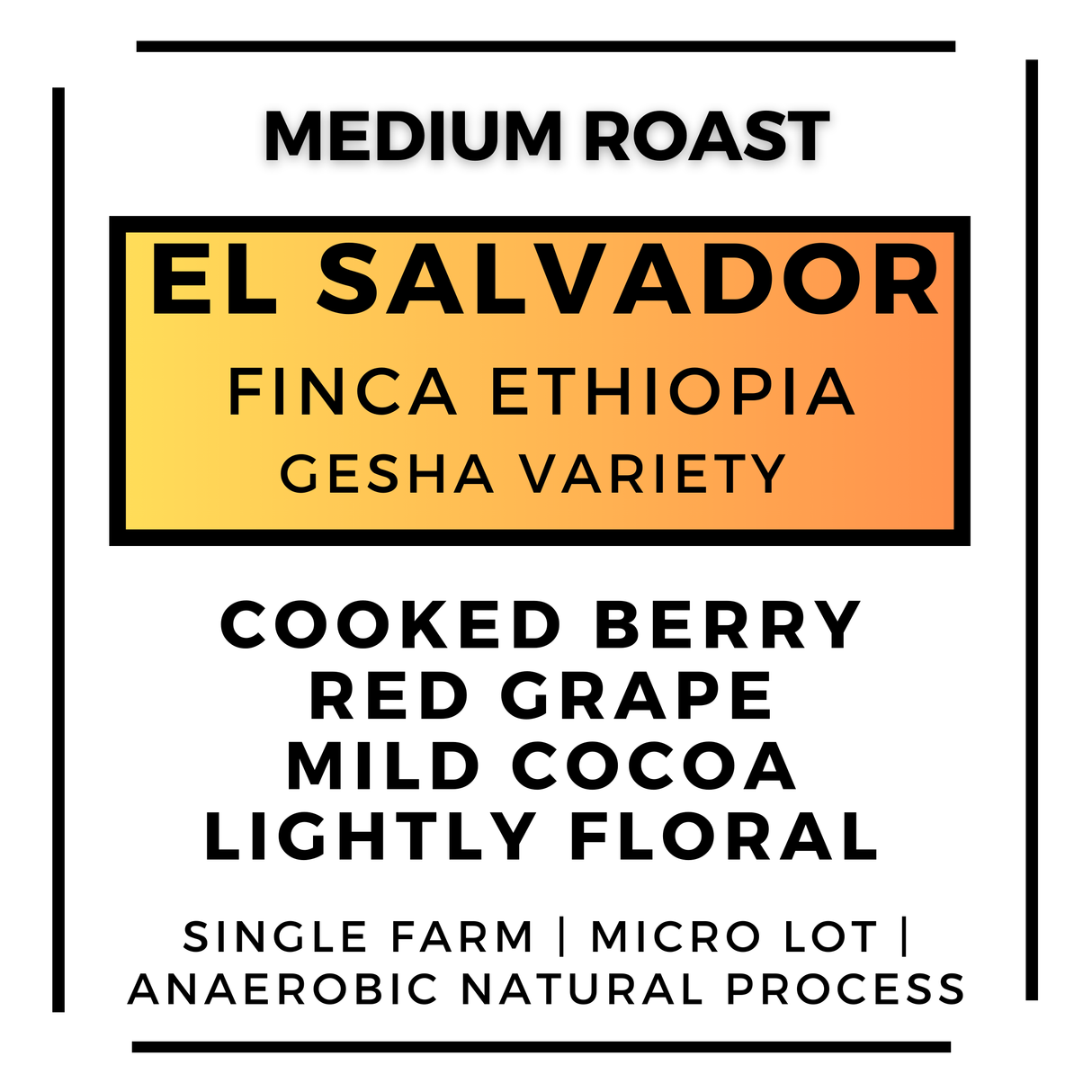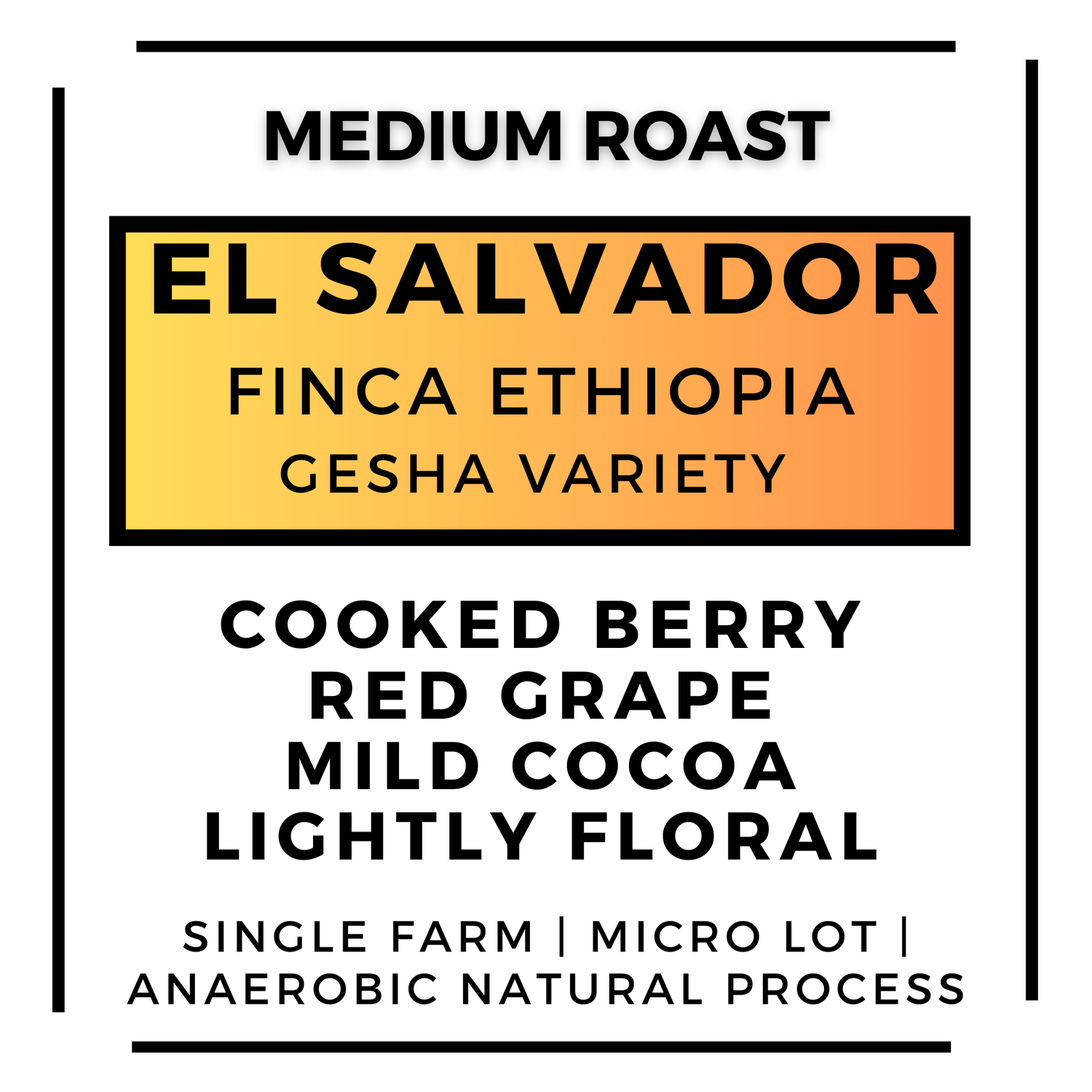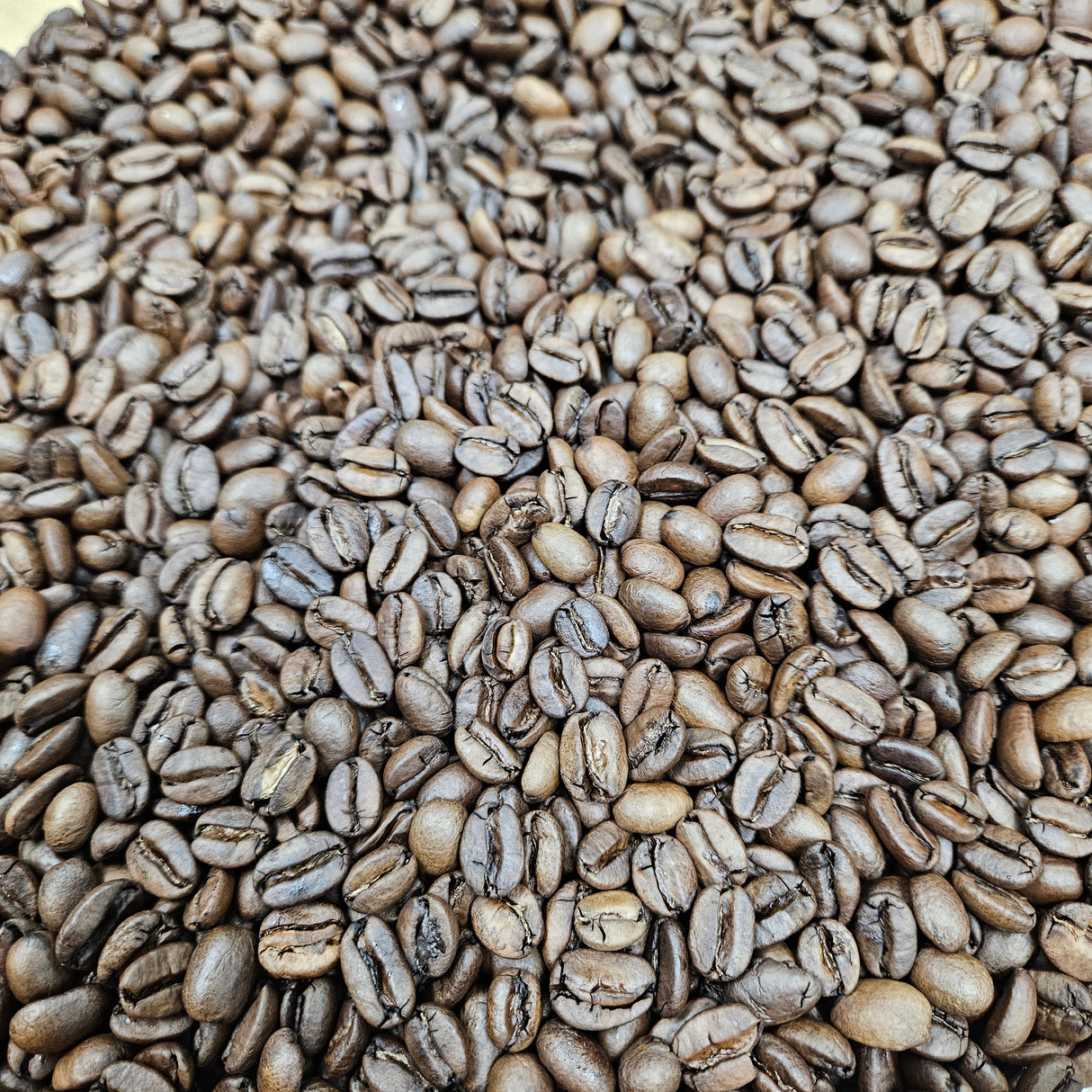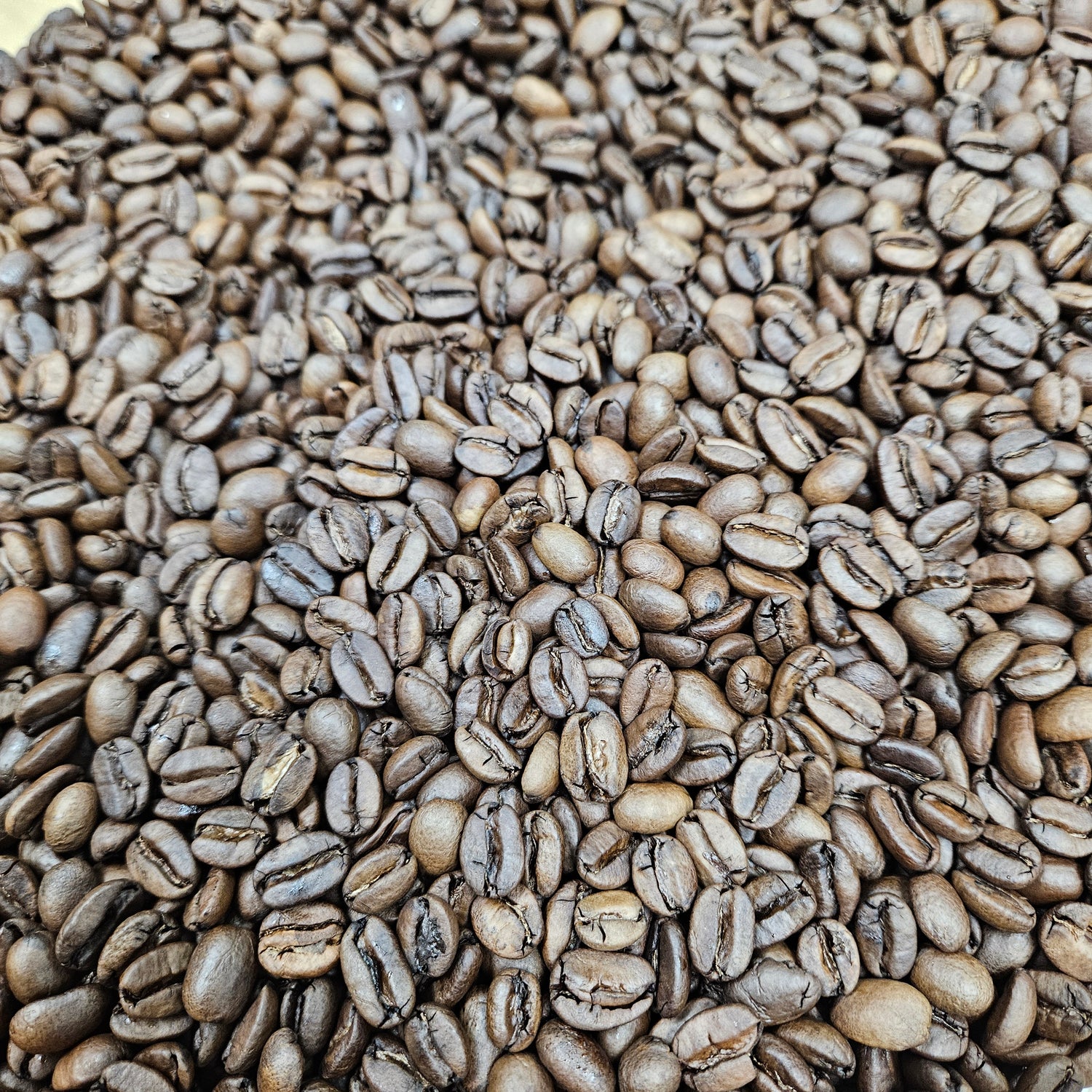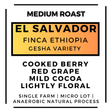El Salvador - Finca Ethiopia - Honey Process Geisha Roasted Coffee
El Salvador - Finca Ethiopia - Honey Process Geisha Roasted Coffee - 16 oz. / Whole Bean is backordered and will ship as soon as it is back in stock.
Pickup available at Fig Leaf Coffee Company
Usually ready in 2-4 days
Care information
Care information
- Always store your coffee away from heat, sun and moisture.
- Do not put it in the freezer or refrigerator.
- Try and grind right before you brew your coffee for optimal flavor.
Delivery and Shipping
Delivery and Shipping
- If we receive your order before noon on a standard business day, we will ship your order the same day.
- Shipping is calculated based on your location, package size and speed of requested service.
- Most orders are shipped with insurance unless you choose economy shipping.

El Salvador - Finca Ethiopia - Honey Process Geisha Roasted Coffee - 16 oz. / Whole Bean is backordered and will ship as soon as it is back in stock.
Description
Description
Summary
Grower: Finca Ethiopia, Los Naranjos Coffee Farm
Region: Apaneca, Ahuachapan, El Salvador
Altitude: 2,100 meters
Soil: Volcanic loam
Process: Honey Process: coffees depulped, and dried in mucilage on raised beds Brewing Recommendations: This coffee does really well as a pour over, Chemex and drip.
Coffee Bean Color Variance: When looking at this coffee, you may notice a difference in the color shade of each bean. Some might be dark while some may be lighter. This is due to the natural process used during the drying phase of production at the farm. Most natural processed coffees will have this type of variance in color.
Details
Finca Ethiopia is a 34.5-hectare farm that was founded in 2018. It is run under Los Naranjos Coffee, a group founded by high school friends who operate several farms in the Apaneca region of El Salvador. Originally named Finca La Gloria, the farm's name was changed to Finca Ethiopia to honor the country where coffee originated. This farm seeks to produce the best coffees under this name.
This property was abandoned for a long time and was renovated. However, something notable is that despite being a farm with 34.5 hectares, the owners decided to conserve the natural forest, so only 13 hectares were cultivated in order to preserve the native flora and fauna. It is located in an area with one of the best views in El Salvador. Situated just behind the Ilamatepec Volcano, its soil is rich in volcanic matter ideal for growing healthy crops. Their coffee is 100% shade-grown with different species of shade trees native to the mountainous area. Since their farm converges with the protected area of the mountain, they have native wildlife such as deer, cotuza, armadillo, toucans, parakeets, and squirrels, among others.
Finca Ethiopia faces struggles that are consistent across the industry. Their crops are no strangers to pests and diseases such as leaf rust. However, they make every effort to understand the soil and overall environment of their farm. By using soil studies to evaluate nutritional properties, they can make informed decisions to help their crops thrive. Weed maintenance is done manually with tools such as machete or cuma, so no chemicals are used. They thank their collaborators in this process. The results they've seen from this work wouldn't be possible without them.
Coffee Processing
As part of their environmental protection practices, they take care of the groundwater through soil conservation work, curtains, water collection pits, and more. Harvest typically runs from February through June. Managers train the coffee pickers on how to cut the coffee cherry with the optimal degree of maturity for a suitable raw material. Before harvesting, areas of the farm are sampled through Brix measurements to best determine ideal ripeness. Picked coffee then heads to the mill where the following classifications are made ahead of processing: From 0 to 20 degrees brix classification A = Processes: Full Washed or Semi-Washed from 21 to 30 degrees brix AA or AAA classification = Processes: Honey, Natural, or Experimental for the anaerobic natural process, it is very important to have constant control of the pH to avoid over-fermentation. The tanks and barrels are suitable for carrying out fermentation with greater control since they have degassers and drain valves. This allows us not only to measure the pH but also the development of sugars through a measurement of brix grains. Their anaerobic naturals are fermented in the tanks for 72 hours under constant monitoring until the pH levels reach 4.05 degrees. It is then moved to the drying area.In this process, it is important to highlight that after the wet processing, the coffee is pre-dried for three days until it reaches approximately 60% humidity. Then it is taken to raised beds and avoid the risk of obtaining an uncontrolled or undesired fermentation. Their mill is located between two mountains, El Pilón and El Aguila, overlooking the coast of the Department of Sonsonate. The elevation is 1400 masl, which causes drying for the full-washed process to take longer than usual. However, this helps to have more homogeneous drying, a cleaner cup, and longer stability of the beans in storage. Bed drying for natural anaerobic coffee has an average duration of 30-40 days.
The coffees are stored once they have reached 10% humidity. Once they enter the warehouse, they are allowed to rest for 24 hours and the humidity is measured again to verify that it is maintained at 10%. This is to account for the climatic conditions of the mill. The dried cherry coffees are placed inside grain pro bags, in polypropylene bags, and sealed with a seam so they cannot be accidentally opened.
Los Naranjos Coffee carries out 4 quality control cuppings, 2 cuppings before being offered and 2 subsequent cuppings after the coffee has rested. All cuppings look to measure consistency or improvement in quality. Experimental processes such as Anaerobic Natural stand out for their control, avoiding phenolic or alcoholic notes. Most importantly they result in very clean cups.
Payment & Security
Payment methods
Your payment information is processed securely. We do not store credit card details nor have access to your credit card information.

